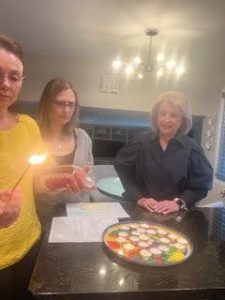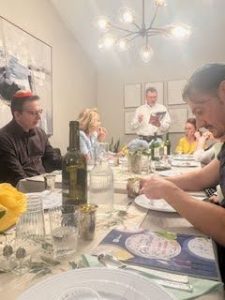
For a total of 358 years, the Isrealities had been controlled, enslaved and exiled from a land they once called home.
Jewish families are currently commemorating the lives of the Israelites and their liberation of slavery. Passover lasts from the evening of Mon. April 22 to Tue. April 30. Maybe you’ve noticed the special Passover meals in the cafeteria last week. With one day left of Passover, here is an explanation for Passover those special meals and the history and traditions surrounding the holiday.
Known as Pesach in Hebrew, this holiday commemorates the Isrealites who lived as slaves in Egypt, and recognizes their ultimate exodus to freedom.
During Seder, a ritual feast at the beginning of Passover, families such as Senior Tali Rabkin and Junior Shayna Friedman host Seder for the first two days of the holiday.
Jewish families like the Rabkins also prepare their home in preparation for Passover.
“The week before we completely ‘Passover proof’ the house by getting rid of chametz (anything not kosher for Passover),” said Rabkin.
During Seder, there are certain steps taken with purposeful references towards various sections in Jewish history.
Sophomore Julia Gudalevich follows an order of 15 steps to recognize the story of how the Jews fled enslavement in Egypt years ago.
“Each step symbolizes a different part of the story or a certain representation of every section of this particular set of history.,” said Gudalevish. “We read from the ‘Haggadah’ to commemorate our ancestors and honor them for what they had sacrificed just for the Jewish people and their freedoms.”
The “Haggadah,” meaning telling, is a 2000-year-old book that tells the story of the Exodus from Egypt. But before telling these stories, the children sing “The Four Questions.”
The 15 steps of Seder are listed as followed (clink on the link provided to learn more about each step):
- Kadesh – Sanctify

The Jewish tradition of lighting a flame to a candle, symbolizing the human soul. This is called Yahrzeit Candle. - Urchatz – Wash Your Hands
- Karpas – Appetizer
- Yachatz – Break the Middle Matzah
- Maggid – Tell the Story of the Exodus
- Rachtzah – Wash Your Hands Again
- Motzi – Blessing Over Bread
- Matzah– Eat Matzah
- Maror – Bitter Herbs
- Korech – The Hillel Sandwich
- Shulchan Orech – The Festive Meal
- Tzafun – Eat the Afikomen
- Beirach – Grace After Meals
- Hallel – Psalms of Praise
- Nirtzah – Accepted
It is essential to eat foods that symbolize the journey the Israelis took from slavery to freedom.
The Seder Plate set out during dinner has a roasted shank bone that represents the Passover sacrifice, an egg representing spring and the circle of life, bitter herbs representing the bitterness of slavery, haroset representing the mortar (apple mixture) used by the Jews in Egypt, and karpas (greens) to represent spring.

Resting on the dining table are three pieces of matzah that represent the bread that the Isrealites took with them when they fled Egypt as well as salt water to represent the tears of the slaves.
The Torah commands that four cups of wine be drunk to represent four expressions of redemption.
Families like Junior Shawna Polster cook up hearty meals, such as “matzah ball soup, chicken, zucchini casserole, chocolate matzah, and my grandma made a chocolate pie.”
The Jewish community is required to not eat bread for a week because, as Sophomore Emma Frid said, “ the Jews had to eat uncooked bread when they were escaping Egypt.”
Junior Talia Millet plays a game with her family, similar to other Jewish families.
“After we eat, my parents and relatives hide the afikomen (matzah) for the cousins to find,” said Millet. “The first one to find it gets a prize.”
According to the PJCC, the story of the Isrealites’ Exodus from slavery is the “foundation of Jewish ethics.” It is the Jewish community’s job to protect and power the powerless, and create a society that is just and compassionate of their previous history.
Passover is a holiday to get together with family and remember those who have suffered in the past. It is to be thankful for the freedom of the current Jewish community and be aware of others.
“Especially during this time with the Israeli war going on, it allows me to become more thankful for my freedom as a Jewish citizen,” Millet said.








![Spider webs, signs, ghosts and different types of candy are examples of how a trunk could be decorated to interest the children participating in Trunk or Treat. “I plan on decorating [my car] with fun spider webs and playing fun Halloween music,” Kurilenko said. Graphic made by Aleah Rothstein.](https://theSHSCourier.com/wp-content/uploads/2025/10/unnamed-2025-10-21T145747.705.png)
![The Solon Girls Golf Team played at the Tanglewood Club at the District Tournament. The course was quite difficult, said coach Damien Kopkas.
“[The course] got a little narrow in spots, certain holes were a little tighter and tree lined," Kopkas said. "There was a lot of elevation changes, so a lot of walking down hills and having to adjust, playing different shots, using different clubs based on whether it was an uphill or a downhill shot."
Image illustrated by Halina Vitkouskaya.](https://theSHSCourier.com/wp-content/uploads/2025/10/unnamed-2025-10-14T105212.017.jpg)


